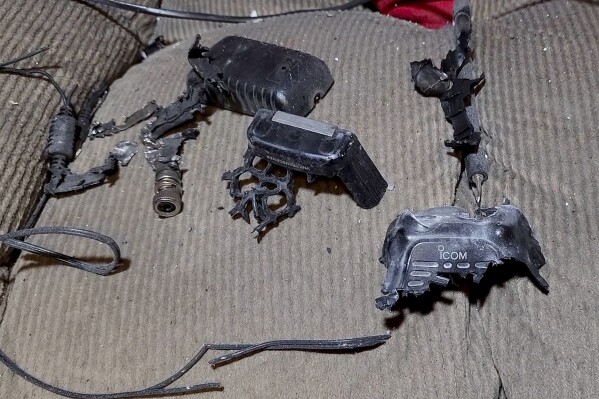A New Era of Warfare Is Here. And It's Terrifying.
For years, Hezbollah leaders urged their rank-and-file to reduce reliance on smartphones, arguing that Israel was able to bug those devices to infiltrate their communication network. The alternative was to go back to the 1990s-era technology of pagers and walkie-talkies, seen as a safer option.
Hezbollah believed that the limited capabilities of pagers allowed them to receive data without revealing a user's location or other compromising information. This belief came right from the top, with Hezbollah chief Hassan Nasrallah urging his members to "bury" their cellphones, worried the Israelis could hack them and discover their movements.
Then this week, Israeli intelligence showed Hezbollah — and the world — that even the most rudimentary consumer technology is no longer safe in an era of advanced warfare.
On Tuesday, pagers used by hundreds of Hezbollah members exploded almost simultaneously across parts of Lebanon and Syria, leaving at least a dozen people dead and more than 2,700 injured.
The following day, 20 more were killed, and hundreds wounded when walkie-talkies in Lebanon also mysteriously exploded. Many of the dead and injured were thought to be Hezbollah members, though there were civilian casualties among them, according to reports in Lebanese media.
The details of how Israeli intelligence carried out the operation, said to be 15 years in the making, are still coming out. It's believed, according to some reports, that Israeli intelligence set up a fake company in Budapest with the explicit aim of selling the explosive-laden pagers to Hezbollah, correctly predicting the militant group would come looking for them.
The coordinated operation, experts told Newsweek, underscores a global shift in battlefield dynamics, where traditional tactics are increasingly giving way to advanced technologies like explosive devices and kamikaze drones powered by artificial intelligence — often leveraging consumer electronics that are readily available online.
The New Battlefield
With nations now focusing on crippling their enemies' digital and electronic systems rather than relying solely on conventional military tactics, defense analyst Hamze Attar said that modern warfare is moving away from traditional battlefields and toward cyber and covert operations.
"Israel is backing Hezbollah into a corner, showing they can't even secure their own operations. While Hezbollah is known for being cyber-aware, this situation sends the opposite message to their supporters," Attar told Newsweek.
"In Lebanon, where the electricity crisis means reliance on battery-powered devices, people are now more cautious than ever."
Attar emphasized the growing vulnerability of civilian infrastructure to increasingly sophisticated cyberattacks. He warned that an advanced, coordinated cyberattack on cars or airplanes could result in mass casualties within seconds, as these systems are increasingly integrated with digital controls that can be compromised.
"If hackers manage to breach airplane systems, we'd face a global catastrophe, with planes falling from the sky. It's a frightening thought, but as a researcher, I expected this long ago," he said.
"With the proliferation of mobile devices and chips everywhere, we have far more offense than defense."
The Supply Chain Problem
With Hezbollah's supply lines compromised and its electronic equipment now under suspicion, the attack this week highlighted a key weakness in modern warfare: reliance on long, loosely connected global supply chains. This growing complexity means more entities are involved in supply chains across more locations, making oversight and accountability harder.
In the pager attack, the devices appear to have come from a Taiwanese company, though it said the pagers were actually made by a Hungarian subcontractor licensed to use its brand.
"The idea that things can be intercepted and tampered with is now well-known," said Bruce Schneier, a renowned security technologist whose work includes poking holes in what he calls the post-9/11 "security theater" at U.S. airports.
"It's also not surprising that Hezbollah buys pagers from a Hungarian company with a Taiwanese supplier. This international supply chain creates vulnerabilities," he added.
While concerns that China could turn e-bikes or mobile phone infrastructure into weapons are largely unfounded, much of today's advanced 5G data networks are increasingly "software-defined." Fears of malicious software updates led the U.S. and U.K. banning the sale and import of communications equipment from Chinese tech companies like Huawei years ago.
For Schneier, while the tactics aren't new—he cites the Mossad's infamous 1998 assassination of Yahya Ayyash, chief bombmaker of Hamas, using an exploding cellphone—he believes the current scenario marks an escalation in how these methods are applied, raising broader questions for global security experts.
"Countries like China could potentially insert booby traps in networking equipment, not to blow them up, but to eavesdrop. What does that mean for security concerns? Are we going to be allowed to take cellphones on airplanes?" Schneier said.
As those concerns grow, authorities are starting taking action. On Thursday, Lebanese officials banned walkie-talkies and pagers on flights from Beirut, according to the state-run National News Agency. Similarly, airlines like Lufthansa have instructed passengers to report any overheating phones to the crew immediately.
That may bring back memories of the Samsung Galaxy Note 7 fiasco, in which faulty batteries led some of those smartphones to overheat and even explode in 2016. But now the concern isn't just about a battery exploding—it's about someone potentially booby-trapping a device and then triggering it to explode remotely.
The Rise of Automation in Warfare
Israel's recent intelligence operation against Hezbollah is just the latest example of how unmanned technology is reshaping the battlefield.
In 2020, Israel used an AI-assisted robot, controlled remotely via satellite, to assassinate Iran's top nuclear scientist. Israel and its allies have also employed cyber warfare to disrupt Iran's nuclear development efforts.
The rapid integration of AI on the battlefield has drawn parallels to the development of nuclear weapons, with some experts calling this the "Oppenheimer moment" for AI. Autonomous drones, including those developed by Israel, are increasingly able to operate with minimal human input, scanning for enemies and launching precision strikes without direct operator control.
The automation of lethal force has been particularly visible in Ukraine's ongoing war with Russia, where it has provided a real-world testing ground for UAV technology. Ukrainian forces have extensively used drones to offset Russia's air superiority, employing kamikaze drones and retrofitting UAVs with thermite payloads that turn them into autonomous flying flamethrowers. Russia has also employed its own drone army on the frontlines.
Eastern Ukraine, a Ukrainian drone drops molten thermite on a Russian-held treeline, setting it ablaze. pic.twitter.com/LWKDj3NGpz
— OSINTtechnical (@Osinttechnical) September 2, 2024
Beyond their immediate military applications, UAVs represent a shift in the broader strategy of modern armies. They offer the potential for lower-cost, high-impact operations that can be controlled remotely, reducing the risk to human soldiers while still allowing for deep strikes into enemy territory.
Of course, that reduction of risk to human life depends on where you're sitting. On X, the largely unmoderated social platform owned by Elon Musk, a quick search unearths countless videos showing weaponized Ukrainian drones hunting and killing Russian soldiers from above.
The clips give the sense of the viewer being in a video game. But they're real.
Likewise, in Gaza, Hamas has used its own Iran-supplied drones to drop grenades onto Israeli tanks, destroying them from above with minimal cost.
Worries about collateral damage and the potential for mass surveillance loom large, not to mention ethical debates over the proliferation of autonomized warfare. Military strategists and human rights advocates worry that increased reliance on autonomous weapon systems are already leading to reduced human oversight in life-and-death decisions — a situation ripe for abuse and miscalculations, as seen in this week's attack.
"Many of the people killed in Lebanon weren't even Hezbollah militants—they were civilians," according to Attar, the defense analyst. "And even if someone is a militant, if they aren't armed and are with their family, they shouldn't be considered combatants in that moment."
Disclaimer: The copyright of this article belongs to the original author. Reposting this article is solely for the purpose of information dissemination and does not constitute any investment advice. If there is any infringement, please contact us immediately. We will make corrections or deletions as necessary. Thank you.




